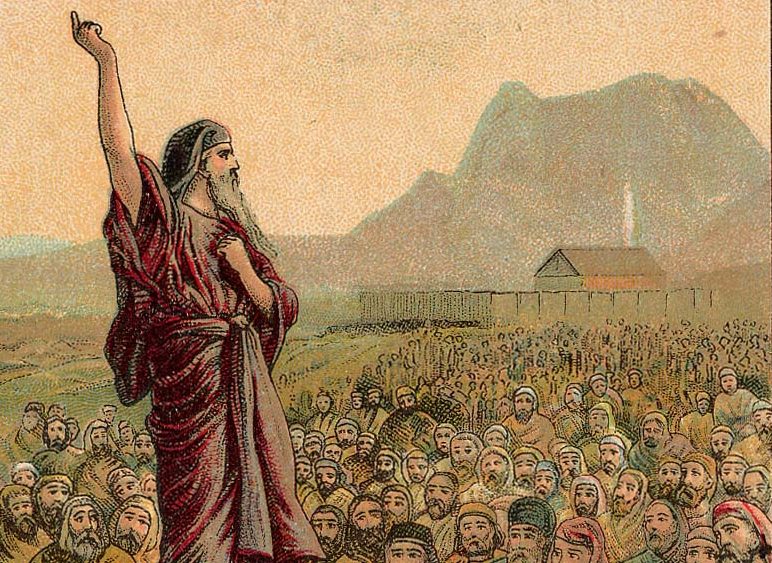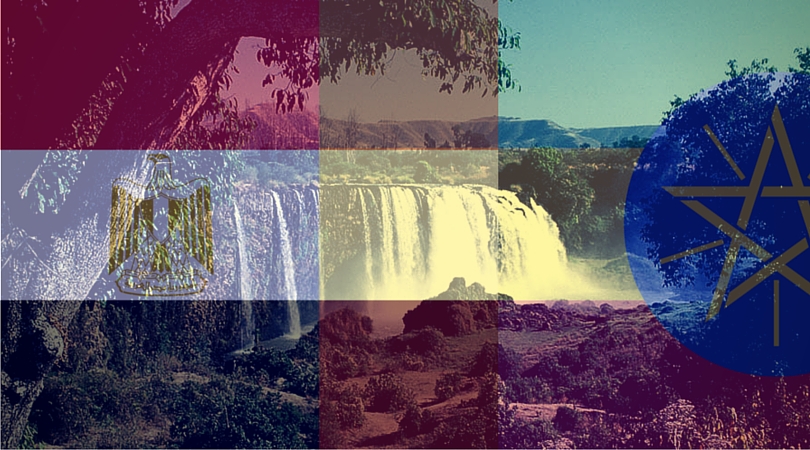“The King of Egypt said to the Hebrew midwives, of whom the name of the first was Shifrah and the name of the second was Puah – and he said, ‘When you deliver the Hebrew women, and you see them on the birth stool; if it is a son, you are to kill him, and if it is a daughter, she shall live.’ But the midwives feared G-D and they did not do as the king of Egypt spoke to them, and they caused the boys to live.” (SHEMOT 1:15-17)
It is taught that Shifrah and Puah are alternate names for Yoḥeved and Miriam – mother and sister to Moshe and Aharon. We further learn that the midwives “feared G-D” and therefore HaShem built them “Houses in Israel” (the priesthood emerged from Yoḥeved and the Davidic dynasty descended from Miriam) – a teaching that highlights the necessity of understanding what it truly means for someone to “fear G-D.”
To fear G-D is actually the highest level of courage because when a person possesses genuine awe of HaShem as the Creator and Source of all that exists, he cannot possibly fear Pharaoh, poverty, prison, torture or even death. “Fearing G-D” is essentially a deep awareness and conviction that nothing exists outside HaShem, which in turn eliminates the ability to fear anything subordinate. It is precisely this elevated consciousness that enabled the midwives to give birth to the greatest leadership our people has known.
Because a slave naturally fears his master and the Hebrews in Egypt were brought up to fear their oppressors, the behavior displayed by Yoḥeved and Miriam was a revolution against the social order of their day. HaShem had not promised these women any reward for endangering themselves and they had no guarantee that they would survive Pharaoh’s wrath. What the midwives did, however, was adhere to the most ancient of Hebrew traditions.
When thrown into Nimrod’s furnace for his crusade against idolatry, Avraham had no expectation of being saved. He understood himself to be a soul – a unique expression of HaShem – temporarily playing the role of a character name Avraham on earth. Rather than contaminate his true inner essence, he was ready to give up the role of Avraham.
During the terrible Holocaust in Europe, there were Jews who felt themselves as having no choice but to actively collaborate with the Germans. Faced with unspeakable conditions and desperate to make it through the horrors of the Shoah alive, they pragmatically understood that the answer to their predicament was to try and survive by assisting the Nazis. But there are prohibitions in the Torah for which one must be willing to give his life rather than transgress. One clear example is that a Jew must die rather than participate in the murder of his own people. “Fearing G-D” in such a situation would prevent the soul from being able to contaminate itself through the act of handing over a fellow Jew to be killed. Therefore, one with a deep and genuine awe of HaShem could not have allowed himself to deliver his people to the slaughter. Life itself would simply no longer feel worth living after having betrayed the very essence of his soul.
A person who genuinely fears HaShem has no personal fear for his own private safety and is automatically infused with a spirit of valor. While this is certainly not an easy level to attain, one can begin to approach it through asking honest questions and being prepared to accept the challenges of difficult answers. The true courage of fearing G-D involves emotional maturity, intellectual honesty and the willingness to burden a national responsibility. Yoḥeved and Miriam risked their lives for what was right, knowing that they could have very easily been killed and forgotten. Like Avraham, they feared G-D because that was the truth of their souls and not because they had any guarantees of survival.
“Fear of G-D” is actually a loyalty to one’s deepest inner truth without any preconditions or expectations for reward. Such self-awareness ultimately makes a person unbreakable – even in the face of overwhelming adversity – as anything one can possibly be threatened with simply becomes inconsequential when viewed within the context of HaShem as the timeless ultimate Reality without end that creates all, sustains all, includes all and is beyond all.
In addition to being the wellspring of great heroism, fearing HaShem is the basis for attaining true love – the ability to give freely without expectations. Rabbi Akiva teaches that the commandment, “you shall love your fellow as yourself” (VAYIKRA 19:18) is the mitzvah that encompasses the Torah in its entirety. It is the base that the Torah rests on in order to be fully revealed in our world. Whether it has a personal, national or universal expression, true love empowers one to not fret about whether or not his love is reciprocal because genuine compassion exists only to give. This love, built on courage, is actually the context and most essential foundation for properly understanding Israel’s Torah.
Moshe was destined to liberate Israel from bondage and lead the Hebrew tribes to receive the Torah at Sinai. But he first grew up in the house of Pharaoh, a place embodying the dark forces standing in starkest opposition to his role. In order to develop the personal qualities necessary to lead Israel from slavery to freedom, Moshe grew up surrounded by the very power that stood against the fundamental essence of his mission. It was precisely this environment that forced Moshe to ask true questions, grow to emotional maturity and realize his destiny as Israel’s savior.
“It happened in those days that Moshe grew up and went out to his brethren and observed their burdens; and he saw an Egyptian man striking a Hebrew man, of his brethren. He turned this way and that and saw that there was no man, so he struck down the Egyptian and buried him in the sand.” (SHEMOT 2:11-12)
Moshe witnessed an Egyptian beating a Hebrew slave and decided to intervene. His compassion for his people was clearly displayed by his preparedness to forfeit his princedom in order to save his brother from harm. At this point Moshe left the world of Egyptian royalty and began to actively express his inner self.
“He went out the next day and behold! Two Hebrew men were fighting. He said to the wicked one, ‘Why do you strike your fellow?’ He replied, ‘Who appointed you as a dignitary, a ruler and a judge over us? Do you propose to murder me as you murdered the Egyptian?’ Moshe was frightened and he thought, ‘Indeed the matter is known!’” (SHEMOT 2:13-14)
The Torah clearly states that Moshe “saw that there was no man” yet here – only a couple verses later – we see another Hebrew with knowledge of his deed. If the matter was known, then obviously there had to have been witnesses around to see Moshe’s act. When the verse writes that he “saw that there was no man” it is coming to teach that he saw no one willing to intervene. No Hebrew slave would stand up for his brother. Pirke Avot teaches that “where there is no man, be a man” (2:6) – no one was intervening so Moshe neutralized the Egyptian himself, knowing that he could lose his royal status and possibly even his life. He readily took this risk because his soul could not bear the suffering of his brother.
Regarding his deed of killing the Egyptian, the Maharal of Prague teaches inGvurot HaShem that “Moshe’s soul was clothed in greatness” – his soul consciously unified with Knesset Yisrael – the larger collective soul of the Hebrew Nation. Moshe had not yet received any prophecy and he certainly had not been commanded to slay the Egyptian. In fact, the prophesied years of Hebrew bondage in Egypt were not even close to complete. Without receiving any Divine sign or command, Moshe could not bear the sight of Hebrew suffering. And his compassionate reaction to the pain of his brother triggered a process of redemption that transformed him from a prince of Egypt to the savior of his people and history’s greatest prophet.
Not able to stomach strife among his brothers, Moshe attempted to make peace. When one responded by asking “do you propose to murder me, as you murdered the Egyptian?” Rashi explains that Moshe suddenly understood that his people were actually not ready for redemption. And the Maharal explains in his Gur Aryeh super-commentary on Rashi that so long as there were informers within Israel, slavery was an appropriate condition for them. This Hebrew threatened Moshe by implying that he could easily turn him over to the authorities. But by exposing Moshe, the informant would have not merely been turning in one man but actually betraying the entire essence of Israel’s redemption. When slavery runs deep into the psychology of a person, it becomes difficult to express the crucial courage and self-sacrifice necessary to break the chains of mental bondage. But when one cares for another to the extent that nothing can deter him, this compassion becomes the power of Israel’s salvation. Whether in Egypt, Europe, America or even Israel, one who internalizes and experiences this love can never cooperate with those seeking to obstruct our national mission. The courage to resist tyranny and stand strong against injustice is actually the first step in attaining a powerful love that will bestow great blessing not only upon Israel but also on the whole of humanity at large as the Hebrew Nation begins to effectively actualize our role of bringing world history to its ultimate goal.





